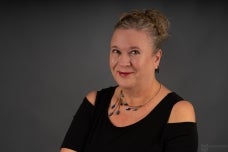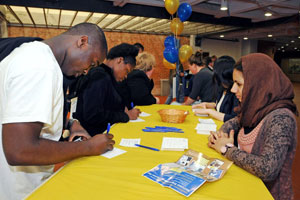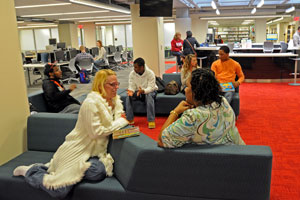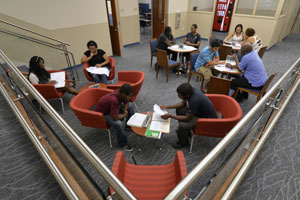Debra Lawrence

Assistant Professor
Business, Computing & Social Science
Contact Information
Marple901 S. Media Line Road
Media, PA 19063
610-723-2000
Room Number: 2314
Phone: 215-983-0447
Contact Faculty
My name is Debra Lawrence and I am one of two full time faculty members in the Early Childhood Education Degree at DCCC. This nationally accredited AA degree fully transfers into four year universities for students interested in completing their bachelor’s degree and obtaining PA Teacher Certification for Pre-k - 4th grade. I am married and have 3 children (all adults) from a previous marriage and have added 3 children (young adults) with this marriage. I am currently a grandmother (Nana) of seven beautiful grandchildren with number seven born in August 2018. This is an exciting time in my life and I am thrilled to be sharing it with each of you. I have worked in early childhood education for over 35 years in a variety of settings and roles as a classroom teacher, director of a child care program, multi-site director, child care resource and referral agency director, and most recently director of a child care quality rating and improvement system in the southeast region of Pennsylvania. I received my undergraduate degree in Social Structure, Research, and Change from Empire State College in Saratoga, NY. I went back to school to get my master’s in early childhood education at the University of Colorado at Denver, and completed my Ph.D. in Early Childhood Education at Walden University. I am excited about our time together and look forward to co-constructing new knowledge with all of you.
Degrees
- PhD Education
- MA Education
- BS Social Research, Social Justice, Social Change
Awards, Grants and other Scholarly Recognitions
- NAEYC, Ed Klugman Lifetime Achievement Award as an Advocate for Play
- Nominated for DCCC Gould Award, 2016, 2017, 2018
- Walden University Don E. Ackerman Research Fellowship in Education Leadership
- Colorado Annual Early Childhood Award 2006
- N/P
Books
- How Public Investment Contributes to Quality Early Childhood Programs. Germany: Scholars Press
- Lessons from Dalian, China. Play, Policy, and Practice Connections, Fall 2015
- Author of two chapters in this book - Gilford, S. Ed (2013). Learning from Head Start. Maryland: Rowman & Littlefield
- Child Care Information and Exchange November/December 2010 Issue – The Power of Classroom Dispositions
- NAEYC 2009 Professional Development Institute DVD of Featured Sessions – Putting Play BACK into Practice
Theoretical Approach, Experience, and Temperament
My philosophy of teaching demonstrates my commitment to both the teaching profession and the preparation of future teachers. Teachers must have an array of unique qualities and characteristics in order to facilitate appropriate settings that foster the development of students’ dispositions of learning. These include high quality instruction that strengthens foundational skills and prepares students for a lifetime of learning. In order for students to have the opportunities for self-directed learning, they require teachers who value learning opportunities that promote critical thinking and problem solving. This teacher engages students in relevant and meaningful learning experiences. As a member of the faculty, my teaching philosophy is centered in developmentally appropriate practice and founded on the importance of student initiated discovery and teacher facilitation as the primary learning strategy. Based on constructivist and socio-cultural theoretical frameworks, my learning environment challenges teacher candidates to perform at a high level, provides opportunities for classroom discussions about relevant issues that pertain to their work with students, and uses real life experiences to deliver course content. As a professor, translating the theoretical frameworks into usable information that can be applied in the classroom is one of my strengths. Challenging teacher candidates to apply child development principles and to plan activities matched to students’ developmental levels is key in designing a curriculum that scaffolds learning and lays the groundwork for academic success. Providing coursework to teacher candidates that is challenging, yet achievable, that pushes them to reach their potential is one of my primary responsibilities as a faculty member. As an educator, I work to develop an inclusive and supportive community of learners who are interested and engaged in the coursework. I model what I want my teacher candidates to do with their students. I pick up on teacher candidate interests, work to identify areas of strengths and areas for growth, and challenge them to reach their unique potential, all in an environment infused with support. As an educator I embed the following beliefs and values into my classroom. 1. All learners come to the learning environment with diverse perspectives, background knowledge, communication strategies, cultural backgrounds, learning styles and work ethic. It is this diversity that brings richness to the learning environment. Each learner must understand themselves before they can understand others and effectively co-construct knowledge in a collaborative learning environment. This means that you will be asked to think and reflect deeply about the topics being discussed and will be engaged in activities that will build your intrapersonal and interpersonal skills. 2. The most conducive learning environment is one that the learner feels both physically and emotionally safe. In order to achieve this, the teacher does not have ultimate authority on any topic but the learner needs to be able to cogently articulate their conceptual understanding when they have an alternative interpretation of the research and theory presented. Mutual respect helps to support an emotionally safe environment and this is achieved by accepting other’s thoughts and opinions, listening carefully and being open to new thoughts and ideas.
Scholarly Interests
- My current scholarly interests on how teachers apply their personal philosophical beliefs into the classroom. Additionally, continued study on how to provide opportunities for children/students of any age or grade level to master the approaches to learning, the foundation of all future learning. Finally, I have a keen interest in the impact and short and long term consequences of trauma on children and adults.













